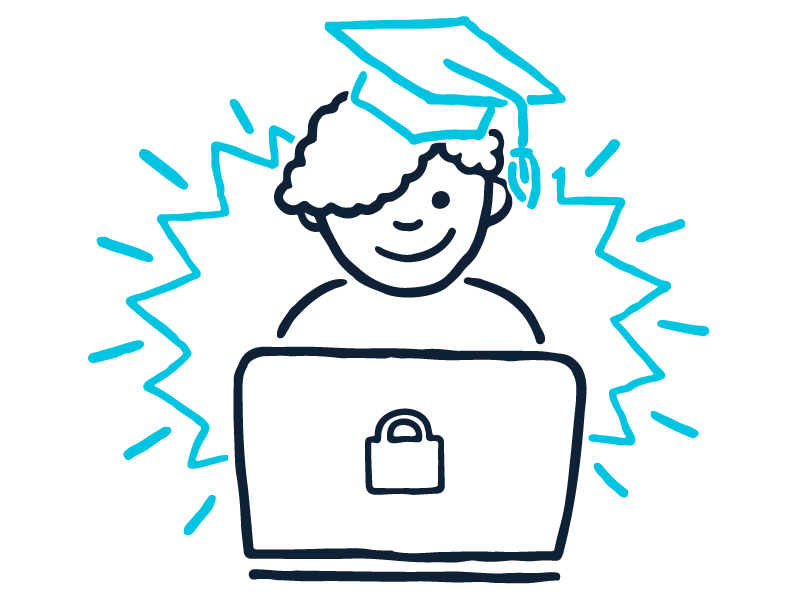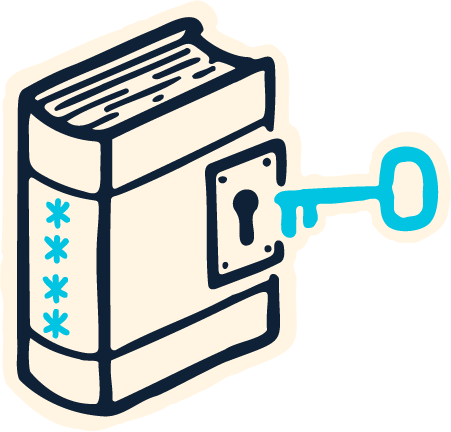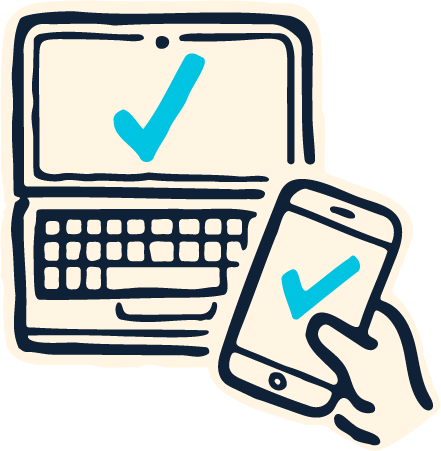
Transcript
Davis: Welcome back. This is the fifth and final episode in our first series of training videos from NYC Digital Safety. My name is Davis, I’m joined by Erin. We’ve talked so far about how and why our data gets compromised, how we can hopefully protect ourselves from such a fate, and what to do if that has happened to you.
So now it’s time to talk about libraries, which is my favorite subject and I know, Erin, it’s one of yours as well. So, Erin, as a library worker yourself, what do you do to raise awareness about these issues?
Erin: Thanks Davis. Privacy is my passion within libraries, and I think it’s, you know, really important that we all understand, you know, this ethical value that we have and figure out how we can help our users understand it and protect their privacy to the best of our ability. And so in my role as Chair of ALA’s Privacy Subcommittee, I really work with our team to create resources and policies that assist libraries of all types and their workers to understand these issues. We have a great website. You can visit chooseprivacyeveryday.org, and that has a blog and it has a weekly news roundup that can actually help library workers stay on top of these privacy-related issues and so that they can then help inform their patrons as well and stay current.
It’s really important that we all understand this ethical value that we have and figure out how we can help our users understand it and protect their privacy to the best of our ability.
Davis: Thank you so much for all the work that you do around these topics. In addition to chooseprivacyeveryday.org, what other resources do you recommend for library workers?
Erin: Yeah, thanks. There’s actually a lot of great stuff out there. I think library workers that have a passion or even kind of a passing interest in privacy should go check out the Library Freedom Institute. There’s a ton of resources, and they run regular in-depth cohorts for library workers to learn all of the ins and outs of privacy, including how to become a privacy advocate. So you can help raise awareness about privacy issues too.
The New York City Digital Privacy and Security courses are also a fantastic resource for those of you who want to sharpen their privacy skills.
And there’s also a few resources that library workers may want to point patrons to when they want to learn more on their own about how to improve their privacy online. So the first one i’ll mention is the EFF Surveillance Self-Defense Course. That’s a really fantastic resource, and people can kind of dig in and figure it out.
And patrons who want to get a toolkit that’s designed for their particular needs should check out the Virtual Privacy Lab from the San Jose Public Library. That was one of my actual first privacy project that I worked on. People can answer some short questions about their own needs online and they’ll get a custom toolkit with privacy resources where they can go take action.
Davis: So back when you were working with the public as a frontline library worker, what were some questions about privacy that you heard from patrons?
Erin: Yeah, I think probably the most common thing is, “hey, what’s my password?”
You know, helping someone load Kindle books onto their device and they’re like, “well, I don’t know what my password is, can you just tell me what it is?” You know, my experience is, the vast majority of people don’t actually want to attend a cybersecurity or privacy workshop at the library unless they already have an interest in it, so that to me means one of the best ways to impart that knowledge is in these like bite-sized chunks when the opportunity arises.
So if you’ve got this question like “what’s my password,” well, it’s a great opportunity to talk about someone with password hygiene. Maybe you talk to them about password managers. You could even, you know, show them the tutorials and show them how to get set up with that.
If you’ve got this question like “what’s my password,” well, it’s a great opportunity to talk about someone with password hygiene.
I also find that patrons will often ask library workers for help filling out forms with sensitive information. They may want help filling out their tax forms, or their form for food stamps, or government assistance of some kind. That’s a really great opportunity to talk about not giving away information to strangers, even if it’s your beloved neighborhood library worker. You can introduce these concepts about data minimization here, and you can discuss, you know, how do you keep your personally identifiable information safe and private? So you know, things like if they’re on a computer working on these documents talking to them about, you know, not getting up and leaving the computer with the screen on with all of their personal information on there for anyone who walks by can grab.
Davis: You do amazing work when it comes to privacy and libraries. You’re one of my heroes on the topic, so thanks for all of that.
I want to give you some time to talk about your current project that, by the time these videos, come out will be available for people to use. So could you share a little bit about the Privacy Field Guides that you’ve been writing?
Erin: Thank you so much, Davis, I really appreciate. It’s always a pleasure working with you and talking about privacy. I enjoy it immensely.
And so, yeah, the field guides. I am super stoked about this project. They are a brand new resource that is available to all library workers from public to academic to school libraries, and each of these seven guides actually covers a different privacy related topic. And the guides were actually designed with the assistance of a graphic design team because we wanted to make them really vibrant, easy to use, something that you can pick up or look at online, and just go.
So myself and my project co-lead Bonnie Tijerina from Data + Society, we actually found that the most common thing that people wanted in the library world were actionable tools to help them with privacy issues. Not everyone, you know, needs to be a privacy expert, or wants to be a privacy expert, and so these guides aren’t designed to turn you into a privacy expert. They’re designed for you to tackle these real world issues and create a more private experience for your users, and to really uphold and live out those ethics and values of privacy within the library world. So the topics actually cover digital security basics, non-tech privacy, how to talk about privacy, data life cycles, privacy audits, privacy policies, and vendors of privacy. So what you’ll find in each of the guides is like a short bit of information and then actually an exercise to guide you through the practice of doing things related to that topic. So you can actually find those guides on ALA’s website, or you can also find them through that chooseprivacyeveryday.org website.
Davis: Thank you and I hope you don’t mind if we also link to them from the NYC Digital Safety digital as well because those sound super useful, and I’m glad you’re doing this work.
So Erin, I want to just tell our viewers that you’ll be back for our final series of training videos, where we talk specifically about libraries and privacy in even greater depth than we are right now. So I look forward to welcoming you back then. I want to thank our funding partner, The Mayor’s Office of the Chief Technology Officer, our colleagues at the New York Public Library, Brooklyn Public Library, and Queens Public Library. And I want to thank all of you for sticking with these videos and we’ll talk to you again soon.
Further Reading
Choose Privacy Everyday
The website of ALA's Intellectual Freedom Committee's Privacy SubcommitteeLibrary Freedom Institute
Library Freedom Institute (LFI) is a free, privacy-focused four-month program for librarians to teach them the skills necessary to thrive as Privacy Advocates; from educating community members to influencing public policy.Surveillance Self-Defense
EFF's expert guide to protecting you and your friends from online spyingVirtual Privacy Lab
Library patrons can use this tool to learn about privacy topics and generate a custom privacy toolkit geared towards their online needs.Privacy Field Guides
Practical, hands-on exercises for you to create a more privacy-focused library. These guides were designed for academic, public, and school libraries of all types. Sponsored by The Institute of Museum and Library Services in partnership with the American Library Association.
Contributor Bios
- This project is funded by the Mayor’s Office of the Chief Technology Officer, and produced in collaboration with Brooklyn Public Library, The New York Public Library, and Queens Public Library.


